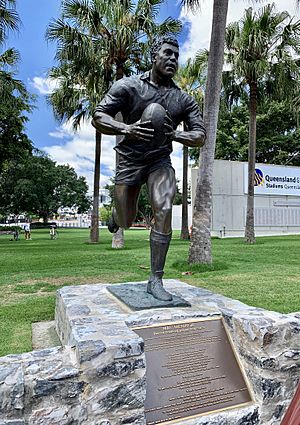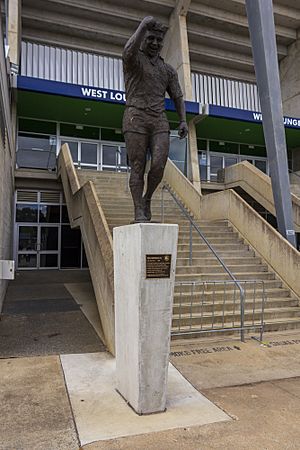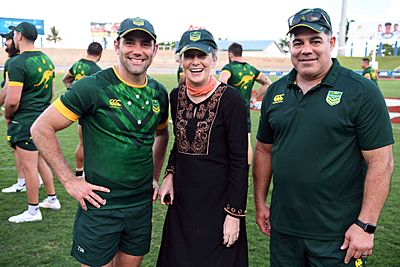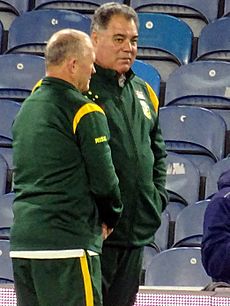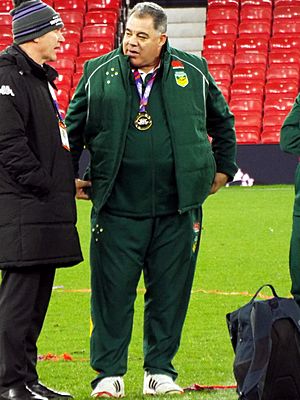Mal Meninga facts for kids
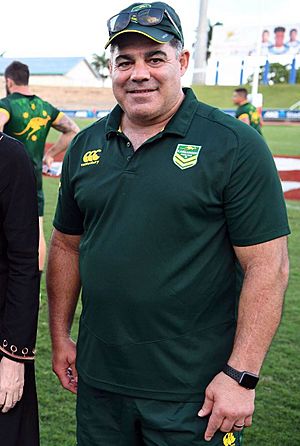 |
|||||||||||||||||||||||||||||||||||||||||||||||||||||||||||||||||||||||||||||||||||||||||||||||||||
|
Personal information
|
|||||||||||||||||||||||||||||||||||||||||||||||||||||||||||||||||||||||||||||||||||||||||||||||||||
|---|---|---|---|---|---|---|---|---|---|---|---|---|---|---|---|---|---|---|---|---|---|---|---|---|---|---|---|---|---|---|---|---|---|---|---|---|---|---|---|---|---|---|---|---|---|---|---|---|---|---|---|---|---|---|---|---|---|---|---|---|---|---|---|---|---|---|---|---|---|---|---|---|---|---|---|---|---|---|---|---|---|---|---|---|---|---|---|---|---|---|---|---|---|---|---|---|---|---|---|
| Full name | Malcolm Norman Meninga | ||||||||||||||||||||||||||||||||||||||||||||||||||||||||||||||||||||||||||||||||||||||||||||||||||
| Born | 8 July 1960 Bundaberg, Queensland, Australia |
||||||||||||||||||||||||||||||||||||||||||||||||||||||||||||||||||||||||||||||||||||||||||||||||||
| Height | 184 cm (6 ft 0 in) | ||||||||||||||||||||||||||||||||||||||||||||||||||||||||||||||||||||||||||||||||||||||||||||||||||
| Weight | 107 kg (236 lb; 16 st 12 lb) | ||||||||||||||||||||||||||||||||||||||||||||||||||||||||||||||||||||||||||||||||||||||||||||||||||
|
Playing information
|
|||||||||||||||||||||||||||||||||||||||||||||||||||||||||||||||||||||||||||||||||||||||||||||||||||
| Position | Centre | ||||||||||||||||||||||||||||||||||||||||||||||||||||||||||||||||||||||||||||||||||||||||||||||||||
|
|||||||||||||||||||||||||||||||||||||||||||||||||||||||||||||||||||||||||||||||||||||||||||||||||||
|
Coaching information
|
|||||||||||||||||||||||||||||||||||||||||||||||||||||||||||||||||||||||||||||||||||||||||||||||||||
|
|||||||||||||||||||||||||||||||||||||||||||||||||||||||||||||||||||||||||||||||||||||||||||||||||||
|
As of 10 November 2024
|
|||||||||||||||||||||||||||||||||||||||||||||||||||||||||||||||||||||||||||||||||||||||||||||||||||
Malcolm Norman Meninga (born July 8, 1960) is a famous Australian rugby league coach and former player. Many people think he is one of the best players ever in the sport. He played for many years in Australia and England, mostly as a goal-kicking centre. After he stopped playing, Meninga became a very successful coach. He is currently the head coach of the Australian national rugby league team.
Meninga set many records during his playing career. He played the most games for the Australian national team. He also scored the most points ever in State of Origin matches. He has received special awards, like being a Member of the Order of Australia. He is also in the Australian Rugby League Hall of Fame. He was even named in the "Team of the Century" for both Queensland and Australia.
Meninga is the only player to be chosen for four Kangaroo Tours. These tours were in 1982, 1986, 1990, and 1994. He played in every test match against Great Britain and France on all four tours. He is also the only player to be captain on two Kangaroo Tours, in 1990 and 1994. He was part of the undefeated 1982 and 1986 teams, known as 'the Invincibles' and 'the Unbeatables'.
As a coach, he started with the Canberra Raiders. Then he coached Queensland to win nine State of Origin titles from 2006 to 2015. In 2016, he became the coach of Australia. He led the Kangaroos to win the 2017 World Cup and the 2021 World Cup. In 2018, Meninga was named the 13th Immortal, a very high honour in rugby league.
Contents
Early Life and Background
Meninga was born in Bundaberg, Queensland. His father, Norman Meninga, also played rugby league. Mal has a brother named Geoffrey. His great-grandfather, Edward Meninga, came from Tanna, an island in Vanuatu. Mal Meninga has sometimes been mistakenly thought to be an Aboriginal Australian.
Meninga went to Maroochydore State High School. He also studied at the Queensland Police Academy. He joined the Queensland Police Service and worked as an officer until 1985. While in the police force, Meninga met Wayne Bennett. Bennett was also a police officer and later became one of Meninga's most important mentors.
Playing Career Highlights
Meninga was the captain of the Australian team for 23 Test matches between 1990 and 1994. He also captained the Queensland State of Origin team for three years. He is the only player to captain two Kangaroo tours, in 1990 and 1994.
Playing for Brisbane
Meninga started his top-level rugby league career at age 18. He played for Southern Suburbs in the Brisbane Rugby League premiership. In 1979, he played for Brisbane and also made his first appearance for Queensland. The next year, he helped Queensland win the first ever State of Origin game against New South Wales. He kicked seven goals in that game, which was on his 20th birthday.
In 1980, Meninga played in the BRL grand final for Souths. He was the top points scorer in the BRL that year. In 1981, Souths won the BRL grand final, defeating the Redcliffe Dolphins.
In 1982, Meninga was named man-of-the-match in a State of Origin game. He then played his first test match for Australia against New Zealand. Later that year, he toured Europe with the undefeated 1982 Kangaroos. This team was nicknamed "The Invincibles" because they won every game. Meninga was the top point scorer on that tour.
He continued to play well in 1983 and 1984, helping Queensland win more Origin series. In 1984, he was the top try-scorer and points scorer in the BRL. In 1985, Meninga helped Souths win another Grand Final. He also went on the Kangaroo Tour of New Zealand.
Playing for St Helens
After his great performances on the 1982 Kangaroo tour, English clubs wanted Meninga to play for them. For the 1984–85 Rugby Football League season, he signed with St. Helens. He helped them win the Premiership. Meninga scored two tries in St. Helens' victory over Wigan in the 1984 Lancashire Cup Final. He also scored two memorable tries when St Helens defeated Hull Kingston Rovers in the 1985 Premiership Final. Even though he only played one season there, he is still a legendary figure in English rugby league.
Playing for Canberra
In 1986, Meninga joined the Canberra Raiders in the New South Wales Rugby League premiership. He suffered a broken arm in 1987 but returned to play in Canberra's Grand Final loss to Manly. He broke his arm two more times in 1988, which meant he missed many games.
After becoming the Raiders' captain, Meninga led Canberra to their first championship in 1989. They beat the Balmain Tigers in extra time in the Grand Final. This made them the first team from outside Sydney to win the premiership. In the post-season, Meninga captained the Raiders in the 1989 World Club Challenge in England.
At the end of the 1990 NSWRL season, Meninga led the Raiders to another Grand Final win against the Penrith Panthers. He was also the top try-scorer and top-point scorer that year. He was named Rugby League Week's player of the year. Meninga was named captain of the 1990 Kangaroos. This was his third Kangaroo Tour. He scored a famous try in the second Ashes test against Great Britain, helping Australia win dramatically. He was also named Britain's BBC Overseas Sports Personality of the Year, the first rugby league player to win this award.
Meninga continued his great form in 1991. He helped Queensland win the 1991 State of Origin series. He also led Australia to a series win over New Zealand. During this time, he broke Michael Cronin's record for most points scored for the Kangaroos.
In 1992, the Raiders had some financial issues and missed the finals. However, Meninga's personal performance remained strong. He captained Queensland in the 1992 State of Origin series. He also led Australia to defend the Ashes against the touring Great Britain Lions. In 1992, Meninga played his 37th test match, breaking the record held by Reg Gasnier. At the end of 1992, Meninga captained Australia to win the World Cup final against Great Britain in London.
The Raiders played strongly again in 1993. Meninga led Australia to a Trans-Tasman Test series win over New Zealand.
On Australia Day 1994, Meninga was made a Member of the Order of Australia for his service to rugby league. Later that year, he played his last game for the Canberra Raiders in the 1994 Grand Final. He led his team to victory, winning their third premiership in six years. Meninga scored the last try of the match.
In 1994, Meninga played his final test match in Australia. He led the Kangaroos to a big win over France. He also played his last State of Origin series for Queensland. New South Wales won that series, making it the only trophy Mal Meninga did not win as a team captain. At the end of 1994, Meninga was chosen for his record fourth Kangaroo Tour. He was also captain for a record second time. Australia won the Ashes series against Great Britain. On December 4, 1994, Mal Meninga captained Australia to a huge victory over France, scoring the final try of his career. In his 46 test matches for Australia, Meninga scored 278 points. Australia won 40 of those games and did not lose a test series while he was playing.
Coaching Career
After retiring as a player, Mal Meninga supported the Super League competition. In 1995, his book Mal Meninga: My Life in Football was published. He became the head coach of his old club, the Canberra Raiders, in 1997.
Coaching the Canberra Raiders
Meninga coached the Raiders from 1997 to 2001. He had some success but not as much as he did as a player. In 2000, he received the Australian Sports Medal. The next year, he received the Centenary Medal for being a role model in rugby league. After the Raiders did not make the finals in the 2001 NRL season, Meninga was replaced as coach.
Coaching Prime Minister's XIII
From 2005 to 2012, Meninga coached the Australian Prime Minister's XIII team. He coached them in 8 matches, winning 7 and drawing 1.
Coaching Queensland
In late 2005, Meninga became the new Queensland State of Origin coach. He had a very successful start in the 2006 State of Origin series, leading Queensland to a 2–1 series victory. He also coached the Prime Minister's XIII to victory in 2006. Meninga continued to coach Queensland to win the 2007 State of Origin series and 2008 State of Origin series. This meant he had won three series in a row.
In the 2009 series, Queensland won their fourth consecutive series. In 2010, Meninga coached Queensland to a fifth straight series win. He also led them to their first "clean sweep" (winning all three games) since 2000. Many people now see him as the most successful Origin coach ever.
In 2011, Meninga achieved his sixth straight series win as Queensland coach. In 2013, he achieved his eighth consecutive series win with the Queensland State of Origin team.
Meninga's amazing winning streak ended when New South Wales won the 2014 State of Origin series. However, in the 2015 State of Origin Series, he coached Queensland to their ninth series win in ten years. They won the final game with a huge 52–6 victory.
Coaching Australia
On December 2, 2015, Meninga was appointed as the head coach of the Australian national rugby league team. This meant he had to stop coaching Queensland. He wanted the international game to be the most important part of rugby league, like it was when he played.
In late 2017, Meninga coached the Australian team to win the 2017 Rugby League World Cup. In October 2022, he named his squad for the 2021 Rugby League World Cup. Meninga coached Australia to victory in the 2021 Rugby League World Cup final against Samoa.
Coaching the Perth Bears
On June 6, 2025, it was announced that Meninga would return to coaching in the NRL. He was named the first coach of the new team, the Perth Bears, starting in 2027. He agreed to coach for at least the 2027 and 2028 seasons. This new role meant he would resign as the head coach of the Australian national team.
Political Involvement
Meninga briefly tried to enter politics in 2001. He ran as an independent candidate for a local election. However, during an interview, he decided to withdraw from the election mid-sentence. This moment became famous for being a very short political career. Sometimes, people in Australia use the phrase "shorter than Mal Meninga's political career" to describe something very brief. A "Mal Meninga moment" refers to when someone can't answer a simple question.
Personal Life
Meninga has been married twice and has children.
Rugby League Records
- Only player to be selected for four Kangaroo Tours (1982, 1986, 1990, and 1994).
- Only player to captain a Kangaroo Tour twice (1990 and 1994).
- Most points scored in Test matches for Australia (272 points from 21 tries and 96 goals) – this record has since been broken by Johnathan Thurston.
- Most goals kicked in Test matches for Australia (96 goals) – this record has since been broken by Johnathan Thurston.
- Most goals kicked in a State of Origin match for Queensland (7 goals in Game 1, 1980) – this record has since been broken by Johnathan Thurston.
- Most State of Origin series won as coach in a row (8 series from 2006–2013).
Honours and Awards
Meninga is seen as an important voice for the South Sea Islander community.
The main grandstand at Canberra Stadium is named the "Mal Meninga Stand" in his honour. The Canberra Raiders' best player each year receives the Mal Meninga Medal. There is also a statue of him at Canberra Stadium next to one of Laurie Daley.
He was inducted into the Sport Australia Hall of Fame in 1994. In 2003, he was inducted into the Australian Rugby League Hall of Fame.
In 2008, Meninga was named one of Australia's 100 Greatest Players (1908–2007). He was also chosen as one of the centres in Australian rugby league's Team of the Century.
In June 2008, he was selected for the Queensland Rugby League's Team of the Century as a centre.
In 2009, as part of the Q150 celebrations, Mal Meninga was named one of the Q150 Icons of Queensland for his sports achievements.
In 2016, Meninga received a Queensland Greats Awards.
On August 1, 2018, Meninga was announced as one of The Immortals. This is the highest honour for a rugby league player.
Playing Statistics
Club Games
| † | Denotes seasons in which Meninga won a Premiership in the BRL or NSWRL |
| Season | Team | Matches | T | G | F/G | Pts |
|---|---|---|---|---|---|---|
| 1979 | 19 | 9 | 76 | 0 | 179 | |
| 1980 | 22 | 17 | 97 | 0 | 245 | |
| 1981† | 20 | 14 | 46 | 0 | 134 | |
| 1982 | 11 | 6 | 26 | 0 | 70 | |
| 1983 | 10 | 8 | 28 | 0 | 88 | |
| 1984 | 19 | 18 | 41 | 0 | 154 | |
| 1984–85 | 31 | 28 | 8 | 0 | 128 | |
| 1985† | 8 | 6 | 0 | 0 | 24 | |
| 1986 | 20 | 3 | 65 | 1 | 143 | |
| 1987 | 12 | 6 | 34 | 1 | 93 | |
| 1988 | 5 | 3 | 7 | 0 | 26 | |
| 1989† | 16 | 2 | 19 | 0 | 46 | |
| 1990† | 24 | 17 | 72 | 0 | 212 | |
| 1991 | 22 | 13 | 57 | 0 | 166 | |
| 1992 | 21 | 6 | 17 | 0 | 58 | |
| 1993 | 20 | 11 | 4 | 0 | 52 | |
| 1994† | 26 | 13 | 8 | 0 | 68 | |
| Career totals | 306 | 180 | 605 | 2 | 1886 | |
Images for kids
-
Meninga (right) with Adrian Lam during his time as coach of the Prime Minister's XIII in 2012
 | Delilah Pierce |
 | Gordon Parks |
 | Augusta Savage |
 | Charles Ethan Porter |


